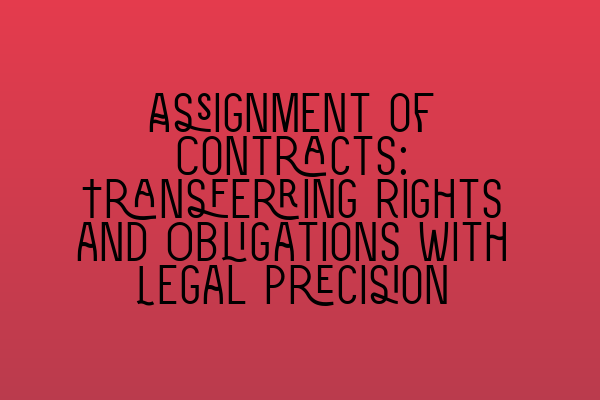As a solicitor, one of the fundamental aspects of contract law that you must understand is the concept of assignment. Assignment allows for the transfer of rights and obligations from one party to another, ensuring legal precision and clarity in contractual relationships. In this blog post, we will explore the ins and outs of assignment, its importance, and how it can be executed effectively.
What is Assignment?
Assignment, in contract law, refers to the transfer of rights and obligations under a contract from one party, known as the assignor, to another party, known as the assignee. This transfer allows the assignee to step into the shoes of the assignor and assume all the rights and responsibilities specified in the contract.
It is essential to note that only the benefits or rights under a contract can be assigned, not the burdens or obligations. This means that the assignor cannot transfer any obligations they have under the contract to the assignee. The assignee, however, becomes entitled to enforce the assigned rights against the other party to the contract.
Why is Assignment Important?
The ability to assign rights and obligations in contracts plays a crucial role in various business transactions. It allows parties to transfer their interests, assets, or contractual benefits, providing flexibility and opportunities for the efficient allocation of resources.
Assignment also enables parties to delegate performance or seek assistance from third parties without the need for renegotiating or terminating existing contracts. This can be particularly valuable when there is a need for specialized expertise or additional financial resources to meet contractual obligations.
Furthermore, assignment can facilitate mergers, acquisitions, and other forms of corporate restructuring. It allows companies to transfer contracts, along with their associated rights and benefits, to ensure continuity and seamless business operations.
Executing Assignment with Legal Precision
When it comes to executing assignment with legal precision, there are certain steps and considerations that solicitors must keep in mind:
- Review the Contract: Before initiating the assignment process, it is crucial to thoroughly review the original contract to understand its terms, any restrictions on assignment, and the rights and obligations involved.
- Check for Prohibition: Some contracts include provisions that restrict or prohibit assignment. It is essential to ascertain if there are any such restrictions in place. If assignment is prohibited, parties may need to seek consent from the other party before proceeding.
- Draft an Assignment Agreement: To ensure clarity and avoid future disputes, it is advisable to draft a formal assignment agreement. This document should clearly outline the rights being assigned, the parties involved, and any conditions or limitations.
- Provide Notice: In most cases, the assignor is required to provide notice of the assignment to the other party. This notice informs the other party that their contractual obligations will now be enforceable by the assignee.
- Consider Third-Party Consent: In certain situations, obtaining the consent of the other party or parties involved may be necessary. This is particularly relevant when the original contract includes personal services or requires a high level of performance.
- Update Records: Once the assignment is complete, it is essential to update all relevant records, including contractual documentation, internal records, and any applicable public registries. This helps maintain transparency and ensures legal compliance.
By following these steps, solicitors can ensure that assignment is executed with legal precision, protecting the interests of their clients and avoiding any potential pitfalls.
Conclusion
Assignment of contracts is a vital tool for businesses and individuals to transfer rights and obligations with legal precision. Understanding the nuances and requirements of assignment is essential for solicitors to provide valuable advice and assistance to their clients.
At SQE Contract Law, we specialize in the intricacies of contract law and can provide comprehensive support in matters related to assignment and other aspects of contract drafting and negotiation. Contact us today to learn more about our services and how we can assist you.
Related Articles:
